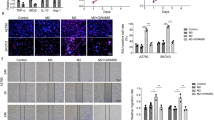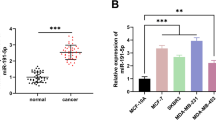Abstract
Despite recent therapeutic breakthroughs, advanced and/or recurrent endometrial cancer still poses a significant health burden globally. While immunotherapy can theoretically lead to durable responses, the benefits to patients remain limited. In an effort to identify novel immunotherapeutic targets, we specifically focused on the potential role of nucleophosmin (NPM, also known as B23) — a nucleolar phosphoprotein involved in tumorigenesis — in cancer immune evasion. Expression profiling with oligonucleotide microarrays was conducted to identify differentially expressed genes in NPM/B23-silenced endometrial cancer cells. CD24 — a heat-stable antigen commonly overexpressed in solid tumors and a target for cancer immunotherapy — was identified as one of the key NPM/B23-regulated molecules. We found that NPM/B23 was capable of inducing CD24 expression, with the Sp1 binding site in the CD24 promoter being essential for NPM/B23-mediated transcriptional activation. Interestingly, NPM/B23 silencing in endometrial cancer cells enhanced phagocytic removal by macrophages through a decreased exposure of CD24 on the cell surface. Conversely, restoration of CD24 expression in NPM/B23-silenced endometrial cancer cells inhibited macrophage-mediated phagocytosis. These results indicate that NPM/B23-driven CD24 overexpression enables endometrial cancer cells to evade from phagocytosis. We further suggest that CD24 may serve as a novel target for endometrial cancer immunotherapy.
Key messages
-
NPM/B23 induced CD24 expression in endometrial tumorigenesis.
-
Sp1 binding site in the CD24 promoter is essential for the activation.
-
NPM/B23 silencing enhanced phagocytosis by macrophages through decrease of CD24 on cancer cells.
-
Restoration of CD24 expression in NPM/B23-silenced cancer cells inhibited macrophage-mediated phagocytosis.







Similar content being viewed by others
Availability of data and materials
All data and materials as well as software application or custom code support our published claims and comply with field standards.
References
Lortet-Tieulent J, Ferlay J, Bray F, Jemal A (2018) International patterns and trends in endometrial cancer incidence, 1978-2013. J Natl Cancer Inst 110:354–361
2017 Cancer Registry Annual Report, 2019 Taiwan: Department of Health, Executive Yuan https://www.hpa.gov.tw/Pages/Detail.aspx?nodeid=269&pid=12235
Lee YC, Lheureux S, Oza AM (2017) Treatment strategies for endometrial cancer: current practice and perspective. Curr Opin Obstet Gynecol 29:47–58
Krishnan V, Schaar B, Tallapragada S, Dorigo O (2018) Tumor associated macrophages in gynecologic cancers. Gynecol Oncol 149:205–213
Makker V, Taylor MH, Aghajanian C, Oaknin A, Mier J, Cohn AL, Romeo M, Bratos R, Brose MS, DiSimone C, Messing M, Stepan DE, Dutcus CE, Wu J, Schmidt EV, Orlowski R, Sachdev P, Shumaker R, Casado Herraez A (2020) Lenvatinib plus pembrolizumab in patients with advanced endometrial cancer. J Clin Oncol 38:2981–2992
Gilliam DT, Menon V, Bretz NP, Pruszak J (2017) The CD24 surface antigen in neural development and disease. Neurobiol Dis 99:133–144
Kim KH, Choi JS, Kim JM, Choi YL, Shin YK, Lee HC, Seong IO, Kim BK, Chae SW, Kim SH (2009) Enhanced CD24 expression in endometrial carcinoma and its expression pattern in normal and hyperplastic endometrium. Histol Histopathol 24:309–316
Kristiansen G, Schluns K, Yongwei Y, Denkert C, Dietel M, Petersen I (2003) CD24 is an independent prognostic marker of survival in nonsmall cell lung cancer patients. Br J Cancer 88:231–236
Sano A, Kato H, Sakurai S, Sakai M, Tanaka N, Inose T, Saito K, Sohda M, Nakajima M, Nakajima T, Kuwano H (2009) CD24 expression is a novel prognostic factor in esophageal squamous cell carcinoma. Ann Surg Oncol 16:506–514
Kristiansen G, Denkert C, Schluns K, Dahl E, Pilarsky C, Hauptmann S (2002) CD24 is expressed in ovarian cancer and is a new independent prognostic marker of patient survival. Am J Pathol 161:1215–1221
Kristiansen G, Winzer KJ, Mayordomo E, Bellach J, Schluns K, Denkert C, Dahl E, Pilarsky C, Altevogt P, Guski H et al (2003) CD24 expression is a new prognostic marker in breast cancer. Clin Cancer Res 9:4906–4913
Kristiansen G, Pilarsky C, Pervan J, Sturzebecher B, Stephan C, Jung K, Loening S, Rosenthal A, Dietel M (2004) CD24 expression is a significant predictor of PSA relapse and poor prognosis in low grade or organ confined prostate cancer. Prostate 58:183–192
Tarhriz V, Bandehpour M, Dastmalchi S, Ouladsahebmadarek E, Zarredar H, Eyvazi S (2019) Overview of CD24 as a new molecular marker in ovarian cancer. J Cell Physiol 234:2134–2142
Eyvazi S, Kazemi B, Dastmalchi S, Bandehpour M (2018) Involvement of CD24 in multiple cancer related pathways makes it an interesting new target for cancer therapy. Curr Cancer Drug Targets 18:328–336
Sagiv E, Starr A, Rozovski U, Khosravi R, Altevogt P, Wang T, Arber N (2008) Targeting CD24 for treatment of colorectal and pancreatic cancer by monoclonal antibodies or small interfering RNA. Cancer Res 68:2803–2812
Sagiv E, Arber N (2008) The novel oncogene CD24 and its arising role in the carcinogenesis of the GI tract: from research to therapy. Expert Rev Gastroenterol Hepatol 2:125–133
Barkal AA, Brewer RE, Markovic M, Kowarsky M, Barkal SA, Zaro BW, Krishnan V, Hatakeyama J, Dorigo O, Barkal LJ, Weissman IL (2019) CD24 signalling through macrophage Siglec-10 is a target for cancer immunotherapy. Nature 572:392–396
Chao A, Lin CY, Tsai CL, Hsueh S, Lin YY, Lin CT, Chou HH, Wang TH, Lai CH, Wang HS (2013) Estrogen stimulates the proliferation of human endometrial cancer cells by stabilizing nucleophosmin/B23 (NPM/B23). J Mol Med (Berl) 91:249–259
Shields LB, Gercel-Taylor C, Yashar CM, Wan TC, Katsanis WA, Spinnato JA, Taylor DD (1997) Induction of immune responses to ovarian tumor antigens by multiparity. J Soc Gynecol Investig 4:298–304
Pianta A, Puppin C, Franzoni A, Fabbro D, Di Loreto C, Bulotta S, Deganuto M, Paron I, Tell G, Puxeddu E et al (2010) Nucleophosmin is overexpressed in thyroid tumors. Biochem Biophys Res Commun 397:499–504
Nozawa Y, Van Belzen N, Van der Made AC, Dinjens WN, Bosman FT (1996) Expression of nucleophosmin/B23 in normal and neoplastic colorectal mucosa. J Pathol 178:48–52
Tsui KH, Cheng AJ, Chang P, Pan TL, Yung BY (2004) Association of nucleophosmin/B23 mRNA expression with clinical outcome in patients with bladder carcinoma. Urology 64:839–844
Di Matteo A, Franceschini M, Chiarella S, Rocchio S, Travaglini-Allocatelli C, Federici L (2016) Molecules that target nucleophosmin for cancer treatment: an update. Oncotarget 7:44821–44840
Chen S, He H, Wang Y, Liu L, Liu Y, You H, Dong Y, Lyu J (2018) Poor prognosis of nucleophosmin overexpression in solid tumors: a meta-analysis. BMC Cancer 18:838
Nishida M (2002) The Ishikawa cells from birth to the present. Hum Cell 15:104–117
Lin CY, Lee LY, Wang TH, Hsu CL, Tsai CL, Chao A, Lai CH (2019) Palbociclib promotes dephosphorylation of NPM/B23 at threonine 199 and Inhibits endometrial cancer cell growth. Cancers (Basel) 11. https://doi.org/10.3390/cancers11071025
Lin CY, Tan BC, Liu H, Shih CJ, Chien KY, Lin CL, Yung BY (2010) Dephosphorylation of nucleophosmin by PP1beta facilitates pRB binding and consequent E2F1-dependent DNA repair. Mol Biol Cell 21:4409–4417
Chao A, Lin CY, Wu RC, Lee YS, Lee LY, Tsai CL, Yang LY, Liu H, Chen SJ, Wang TH, Lai CH (2018) The combination of everolimus and terameprocol exerts synergistic antiproliferative effects in endometrial cancer: molecular role of insulin-like growth factor binding protein 2. J Mol Med (Berl) 96:1251–1266
Ring NG, Herndler-Brandstetter D, Weiskopf K, Shan L, Volkmer JP, George BM, Lietzenmayer M, McKenna KM, Naik TJ, McCarty A et al (2017) Anti-SIRPalpha antibody immunotherapy enhances neutrophil and macrophage antitumor activity. Proc Natl Acad Sci U S A 114:E10578–E10585
Wang L, Liu R, Li D, Lin S, Fang X, Backer G, Kain M, Rammoham K, Zheng P, Liu Y (2012) A hypermorphic SP1-binding CD24 variant associates with risk and progression of multiple sclerosis. Am J Transl Res 4:347–356
Wang L, Liu R, Ye P, Wong C, Chen GY, Zhou P, Sakabe K, Zheng X, Wu W, Zhang P, Jiang T, Bassetti MF, Jube S, Sun Y, Zhang Y, Zheng P, Liu Y (2015) Intracellular CD24 disrupts the ARF-NPM interaction and enables mutational and viral oncogene-mediated p53 inactivation. Nat Commun 6:5909
Malumbres M, Barbacid M (2005) Mammalian cyclin-dependent kinases. Trends Biochem Sci 30:630–641
Li J, Lu Y, Akbani R, Ju Z, Roebuck PL, Liu W, Yang JY, Broom BM, Verhaak RG, Kane DW et al (2013) TCPA: a resource for cancer functional proteomics data. Nat Methods 10:1046–1047
Qi W, Shakalya K, Stejskal A, Goldman A, Beeck S, Cooke L, Mahadevan D (2008) NSC348884, a nucleophosmin inhibitor disrupts oligomer formation and induces apoptosis in human cancer cells. Oncogene 27:4210–4220
Chanput W, Peters V, Wichers H (2015) THP-1 and U937 Cells. In: Verhoeckx K, Cotter P, Lopez-Exposito I, Kleiveland C, Lea T, Mackie A, Requena T, Swiatecka D, Wichers H (eds) The impact of food bioactives on health: in vitro and ex vivo models, Cham (CH), pp 147–159
Bradley CA (2019) CD24—a novel 'don't eat me' signal. Nat Rev Cancer 19:541
Acknowledgements
We thank Jung-Erh Yang and Chu-Chun Huang for their excellent technical assistance. Formalin-fixed paraffin-embedded specimens were kindly provided by the Tumor Bank.
Funding
This study was financially supported by grants from the Chang Gung Foundation (CMRPG3K1781) and the National Science Council (NSC 107-2320-B-182A-012).
Author information
Authors and Affiliations
Contributions
Conceptualization: Chiao-Yun Lin, An-Shine Chao, Chyong-Huey Lai; Methodology: Chiao-Yun Lin, Chia-Lung Tsai; Formal analysis and investigation: Chiao-Yun Lin, Angel Chao, Li-Yu Lee, Wei-Chun Chen, Yun-Hsin Tang; Writing — original draft preparation: Chiao-Yun Lin, Chia-Lung Tsai, Angel Chao; Writing — review and editing: An-Shine Chao, Chyong-Huey Lai; Funding acquisition: Chiao-Yun Lin; Resources: Angel Chao, Chyong-Huey Lai; Supervision: An-Shine Chao, Chyong-Huey Lai.
Corresponding authors
Ethics declarations
Ethics approval
Ethics approval for retrieving of clinical data from the databank of the Division of Gynecologic Oncology (Chang Gung Memorial Hospital) was granted by the local institutional review board (approval numbers: 201801840B0 and 201901344B0).
All animal procedures were approved by the Animal Care Committee of the Chang Gung Memorial Hospital Institutional Review Board (approval numbers: 2018110702 and 2019090301).
Consent to participate
The IRB reviewed and determined that it is expedited review according to case research or cases treated or diagnosed by clinical routines.
Consent for publication
Not applicable.
Conflict of interest
The authors declare no competing interests.
Additional information
Publisher’s note
Springer Nature remains neutral with regard to jurisdictional claims in published maps and institutional affiliations.
Supplementary Information
ESM 1
(DOCX 1279 kb)
Rights and permissions
About this article
Cite this article
Lin, CY., Tsai, CL., Chao, A. et al. Nucleophosmin/B23 promotes endometrial cancer cell escape from macrophage phagocytosis by increasing CD24 expression. J Mol Med 99, 1125–1137 (2021). https://doi.org/10.1007/s00109-021-02079-x
Received:
Revised:
Accepted:
Published:
Issue Date:
DOI: https://doi.org/10.1007/s00109-021-02079-x




